Congreso Nacional del Cafe´ 2015
ANACAFE
August 13–14, 2015
Ciudad de Guatemala, Guatemala
http://anacafe.org
Congreso Nacional del Cafe´ 2015
ANACAFE
August 13–14, 2015
Ciudad de Guatemala, Guatemala
http://anacafe.org
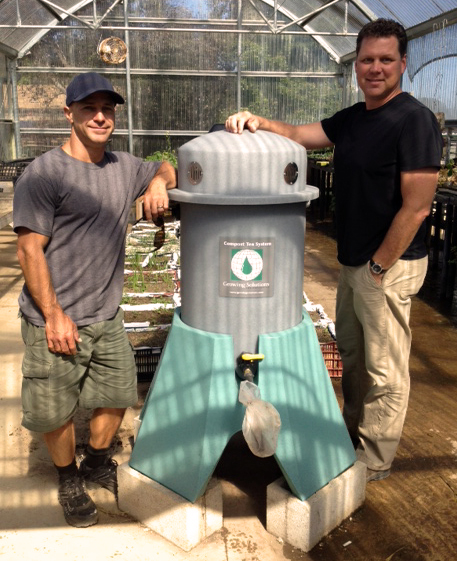
Acknowledging one’s roots is something many of us recognize as our careers begin to mature. Giving back to the fertile fields of learning can be as simple as writing a check, or as specific as donating a 25 gallon Compost Tea System. To Richard Slye and his wife Tanya, the latter was the perfect way to express their gratitude for their time spent as Farm and Garden apprentices at the University of California, Santa Cruz (UCSC). For Growing Solutions President Michael Alms, it is a “pay it forward” gesture.
UCSC’s Center for Acroecology & Sustainable Food Systems (CASFS) is dedicated to increasing ecological sustainability and social justice in the food and agriculture system. On the UCSC campus, the Center operates the two-acre Alan Chadwick Garden and the 25-acre Farm. Both sites are managed using organic production methods and serve as research, teaching and training facilities for students, staff and faculty. “My students,” Garden Manager Christof Bernau explained, “are always asking about practical tools and techniques to promote plant health that they can produce on farm/in garden, and compost tea is a clear example of how to exponentially benefit from something already part of the farm and soil fertility management system.”
The CASFS program has graduated 40 students each year for the last 40 years. Eight of the 40 make the cut each year for their role in the second year as staff for the incoming students. Richard and Tanya, both first and second year apprentices in the program between 1998 and 2000, met at CASFS, graduated and went on to manage some of the finest agricultural properties in California over the last 12 years. “To say that the apprenticeship was the single most important part of my career would be an understatement,” Richard explained. “The beautiful, productive farm is much more than a career builder alone. Its energy is the product of more than 40 years of training people to be responsible thoughtful stewards of our planet. That collective soul permeates the farm and influences all its activity. It is something to experience, if only for a day.”
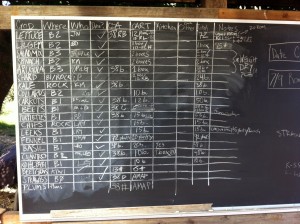
The day that Richard and Michael delivered, set up and demonstrated the Growing Solutions Compost Tea System25 on the UCSC campus sparked new energy in Madeleine Morley, a second year apprentice overseeing the fledgling compost tea program. “Maddie was thrilled to learn from both of you and share some of her experiences so far. She’s very motivated and focused on making compost tea a regular part of our fertility, pest and disease and plant health management repertoire,” Christof noted. Growing Solutions has worked with a number of CASFS graduates currently in the industry, many on the cutting edge of sustainable practices. “The quality and discipline the CASFS experience offers is evident, having worked with a number of talented graduates from this program,” Michael said. “We want to support future students who can gain hands-on knowledge working with compost tea, and carry it forward into the industry.”
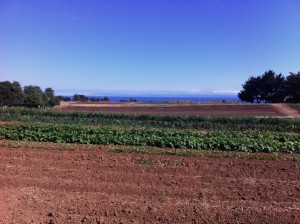
The joint donation of the System25 from the Slyes and Growing Solutions becomes part of an exceptional endeavor with a longstanding history. “This donation was the perfect opportunity for Tanya and I to help facilitate the Farm and Garden’s desire to incorporate compost tea into their curriculum,” Richard said. “This machine, in the hands of 40 different apprentices each year, will surely create its own collective knowledge about compost tea.” Christof agreed, saying “this new knowledge and tool will be incredibly useful in training the next generation of farmers, gardeners and agricultural educators. I am really looking forward to seeing it all unfold.”
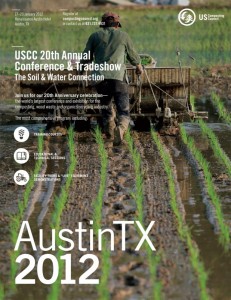
“The Soil and Water Connection, the 20th Annual US Composting Council Conference theme, certainly brought Compost Tea to mind as a cost effective tool to support water holding capacity in soil,” Growing Solutions President and USCC member Michael Alms commented while in Austin, TX. (We’ll go deeper into the subject of water holding capacity and Compost Tea in future posts.)
In other Council news, new Executive Director Michael Virga gave an excellent plenary speech outlining many new directions for USCC. Virga announced the relocation of USCC headquarters to Bethesda, MD in April 2012, allowing a more strategic proximity to Capitol Hill and key decision makers that will lift compost awareness on a national level.
“Presenters and attendees discussed establishing vermicompost as a distinct and viable new frontier,” Michael noted as the conference ended. ”Growing Solutions is looking forward to new projects implementing the use of vermicompost and Compost Tea throughout Mexico in 2012 with a new strategic partnership,” he added.
Chronicling more than two decades of growth and changes in earthworm composting technology, Clive A. Edwards, Norman Q. Arancon and Rhonda L. Sherman co-edited Vermiculture Technology: Earthworms, Organic Wastes, and Environmental Management, a 623-page international, comprehensive, and definitive work on how earthworms and microorganisms interact to break down organic wastes on a commercial basis. Published by CRC Press, the book includes research from scientists around the world, exploring the dramatic growth and change in vermiculture technology since 1988.
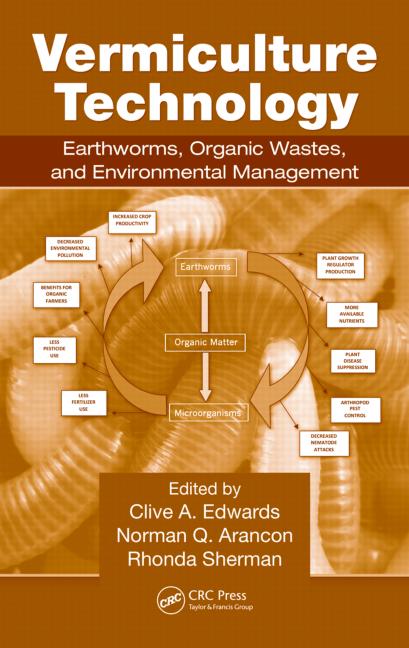 The use of vermicompost tea is detailed in Chapter 11, The Production of Vermicompost Aqueous Solutions or Teas, written by Cindy Salter and Dr. Edwards. Cindy, a long-time advocate of composting and compost tea, has worked with Seeds of Change at its Oregon production farm and is currently with Growing Solutions. Growing Solutions’ Compost Tea Systems using Fine Bubble Diffusion technology are shown in the book as an example of aerated compost tea production. Cindy’s contribution to the book is in part due to her work with Mary Appelhof, to whom the book is dedicated. Cindy recalled, “Mary was partly responsible for my introduction to compost tea in 1999. She inspired many of us to dig into this field and share her enthusiasm for worms and their ‘micro-brethren.’”
The use of vermicompost tea is detailed in Chapter 11, The Production of Vermicompost Aqueous Solutions or Teas, written by Cindy Salter and Dr. Edwards. Cindy, a long-time advocate of composting and compost tea, has worked with Seeds of Change at its Oregon production farm and is currently with Growing Solutions. Growing Solutions’ Compost Tea Systems using Fine Bubble Diffusion technology are shown in the book as an example of aerated compost tea production. Cindy’s contribution to the book is in part due to her work with Mary Appelhof, to whom the book is dedicated. Cindy recalled, “Mary was partly responsible for my introduction to compost tea in 1999. She inspired many of us to dig into this field and share her enthusiasm for worms and their ‘micro-brethren.’”
Seeds of Change Director of Seed Production Joel Reiten has wormed his way through all 623 pages, and declared the book an enjoyable read. “This is the most comprehensive, first of its kind compilation of real science with tremendous value for the growing vermicompost and vermicompost tea industry. Commercial growers are eager for this kind of data in order to justify incorporating vermicompost and vermicompost tea into their acreages,” Joel explained.
Vermicompost Technology is available through CRC Press in hardcover and eBook, and in hardcover at amazon.com.
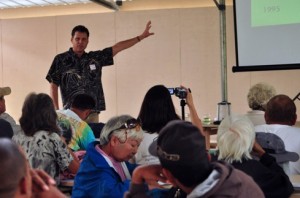
Sold out! Two words we usually hear from garden centers offering compost tea as the growing season heats up…but this time it was a sell out crowd at a full day workshop in Hilo, HI, organized by the Hawaii Organic Farmers Association and funded by the University of Hawaii. The more than 80 in attendance soaked up the latest research and innovative uses of compost, vermicompost and compost tea during presentations and field trips over the course of the day. Presenters included Dr. Norman Arancon (Sustainable Agriculture Program, CAFNRM), Dr. Ted Radovich (Sustainable Farming Systems Laboratory, UH-CTAHR) and Growing Solutions’ Michael Alms. The afternoon included an on site compost tea demonstration in a commercial vegetable operation at Island Harvest Organics in Pahoa. Michael offered an overview of the 15-year-old compost tea industry, and a look to the future in tropical environments and elsewhere.
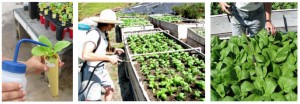
Hawaii is leading the world in researching compost tea and its use in tropical and subtropical production systems. The University of Hawaii has a dedicated department for organic and sustainable agriculture, with Dr. Radovich and Dr. Arancon leading the efforts. Dr. Radovich discussed the current SARE (Sustainable Agriculture & Research Education) grant project using compost tea on pak choi. Growing Solutions is participating in this project to further a better understanding of the use of compost tea in on-farm trials and through educational activities, including the May 6 Hilo event.
Dr. Arancon is co-editor of the latest and most comprehensive text discussing compost and compost tea, Vermiculture Technology: Earthworms, Organic Wastes, and Environmental Management. Stay tuned for a post about this culmination of work from an international cast of scientists. Dr. Arancon and Dr. Radovich both work with Compost Tea System10s in their research efforts at UH/Hilo.
1702 W 2nd Ave.
Suite B
Eugene, OR 97402
541-343-8727